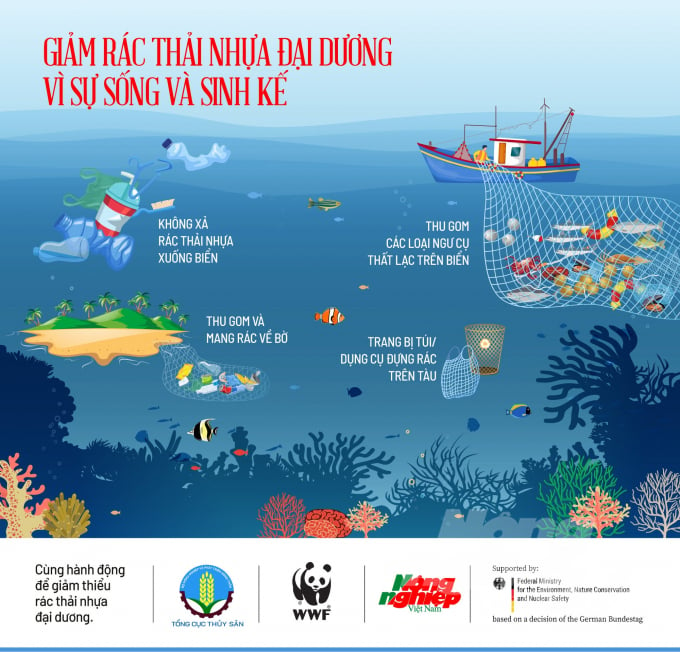May 23, 2025 | 20:19 GMT +7
May 23, 2025 | 20:19 GMT +7
Hotline: 0913.378.918
May 23, 2025 | 20:19 GMT +7
Hotline: 0913.378.918
Plastic pollution has reached enormous scale worldwide and had serious impact on the marine environment and social life. About 12 million tons of plastic are dumped into the ocean every year, with the largest loss going to the Indian and Pacific Oceans, where many coastal lands and countries are located. And Vietnam is not an exception to the negative impacts of ocean plastic waste.
Due to a dynamic economy, rising living standards and changing consumption patterns, Vietnam's plastic consumption is increasing annually at 16% - 18% per year from 2010 to 2020. In 2015, it is estimated that each Vietnamese person consumed up to 41kg of plastic in 2019.
The proportion of plastic in urban waste in Vietnam is also on the increase. Although there have been improvements, a large amount of plastic is still not collected and burned open-air or discharged into the environment, causing harm to the terrestrial and marine environment.
The need for a transition to more sustainable packaging and more efficient plastic waste management has been highlighted by the Government, the Ministry of Agriculture and Rural Development (MARD), the General Deparment of Fisheries and the World Wildlife Fund in Vietnam (WWF-Vietnam) has established action programs to call on the community, especially fishermen, to have responsibility in using and preserving plastic equipment; When disposing of waste, it should be collected and brought to the shore for treatment, helping to make the sea cleaner.

The World Wide Fund in Vietnam (WWF-Vietnam) cooperates with many agencies to reduce ocean plastic waste for life and livelihood. Photo: Hai Nam.
A clean marine environment is a beautiful ecosystem, a safe and abundant source of seafood, helping fishermen have bountiful fishing crops. Understanding the types of ocean plastic waste, its harmful effects on the environment, health and especially the livelihoods of fishermen and aquaculturists are essential. Guidance to reduce plastic waste in daily life as well as in fishing and aquaculture activities, with an aim to build a clean environment for fish and shrimp, tourism development and safety for people.
To do so, the social community needs to take action, but the most important thing is the consciousness of each person, in which fishermen make up the majority.
WWF- Vietnam urges fishermen to:
* Fishermen should adopt appropriate practices in responsible fishing, including compliance with space/time constraints and shared use of stationary/fixed fishing gear areas to avoid conflicts over the use of the water surface area between fishing gear and vessels; marking fishing gear with full details of ownership and placing the markings in a conspicuous place on the fishing gear; Dispose of expired and damaged fishing gear in suitable locations and in accordance with the regulations of each construction/port.
* Report to authorities when fishing gear is lost and retrieve it if the fishing gear is still usable. Fishermen should bring salvaged fishing gear on board and train crew members on safe fishing methods; immediately report on lost fishing gear to relevant fisheries management agencies, collect all types of fishing gear lost at sea; and participate in the regional Ocean Plastic Waste Collection programs to help the marine environment and its own fishing grounds.
* Share expertise to jointly prevent and reduce fishing gear left in the ocean. Fishermen should participate in the improvement of fishing gear and share practical knowledge to jointly prevent the impact of fishing gear left in the ocean; participate in training novice fishermen on how to prevent the loss of fishing gear, explaining the reasons and the benefits to their profession; collaborate in implementing programs to retrieve fishing gear left in the ocean and contribute to raising awareness on the impact of fishing gear left in the ocean.
Translated by Nguyen Hai Long

(VAN) The People's Committee of Tra Vinh province has approved an adjustment to the investment policy for the Green Hydrogen Plant project, increasing its area to approximately 52.76 hectares.
![Reducing emissions from rice fields: [2] Farmers’ commitment to the soil](https://t.ex-cdn.com/nongnghiepmoitruong.vn/608w/files/news/2025/05/05/dsc08881jpg-nongnghiep-140632.jpg)
(VAN) Clean rice cultivation model in Thuong Tan commune, Bac Tan Uyen district, is assisting local residents in achieving sustainable agriculture by substantially reducing costs, increasing productivity, and protecting the environment.

(VAN) At the conference to disseminate Resolution No. 68, AgriS introduced its digital agricultural ecosystem and reaffirmed its commitment to accompanying the Government in promoting private sector development and sustainable agriculture.

(VAN) 'Blue Ocean - Blue Foods' initiative is designed to restore marine ecosystems and establish sustainable livelihoods for local communities by cultivating a minimum of 1,000 hectares of cottonii seaweed in the first three years.
/2025/05/21/4642-3-112707_603.jpg)
(VAN) The V-SCOPE project has made direct contributions to three out of six pillars of the Comprehensive Strategic Partnership between Vietnam and Australia.

(VAN) Facing the threat of rabies spreading to the community, Gia Lai province urgently carries out measures to vaccinate dogs and cats on a large scale.

(VAN) Disease-free livestock farming not only protects livestock herds but also stabilizes production and livelihoods for many farmers in Tuyen Quang.